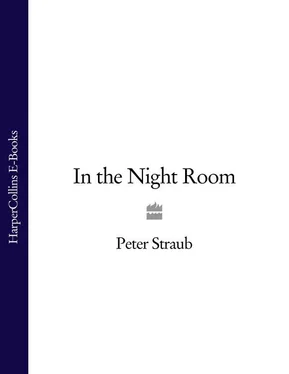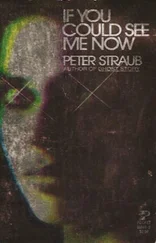Dr Bollis had let her believe that he had read her books. Willy thought he had probably read perhaps half of both of them.
—Something new, she said.
Her doctor gave her a look of careful neutrality.
—It’ll be good for me. It already is.
—Can you tell me what it’s about?
She frowned.
—Who’s the main character?
—A brave little person named Howie, she said, and immediately burst into tears. Willy had never told Dr Bollis that when her daughter, Holly, was first beginning to speak, and then for a long time after, she spoke of herself as ‘Howie.’ In fact, Willy tried never to speak of Holly to Dr Bollis.
Willy could remember writing very little of her third and most successful book. Much of what happened in the Institute had been a blur of smeary voices nattering on and on; the same blurriness took over when she thought about the beginning of her book, except that the incessant voices had been those of her characters. After she seemed to have recovered sufficiently from the shock of her great loss, she returned to New York feeling like an unpeeled egg. She settled herself back in her little apartment, where In the Night Room amplified itself into a kind of fever dream from which she awoke, dripping with sweat, pulse rocketing, only long enough to order Chinese food, do the crossword puzzle, or collapse into sleep. Once, on a slow day for both of them, she played Scrabble with her old, amusing college friend Tom Hartland, who wrote detective books for boys, and crushed him, pulverized him, left him gasping and bleeding on the board. She had met with her dead husband’s lawyers and discovered that she was, by almost anybody’s standards, wealthy; two or three times in that period, she had lunches or dinners with Molly Harper and Tom. (He had once told her that his greatest problem was keeping his boy hero from having sex with the other boys he met in the course of his investigations.) An utterly kind man, Tom came around four or five times to make sure Willy was eating—actually, he used his concern about her diet as his way of making sure she could keep herself together. And she was, largely due to her furious obsession with her book. Willy knew she was using the book as a kind of therapy, also as a way of shutting out the world, but it was as though she had no choice as to how these months were to be spent. In the Night Room had taken her over, demanding to be written. When people praised it to her, Willy felt as though she were being given credit for someone else’s accomplishment.
During one of their lunches, Tom Hartland told her, I wish I could write a book that way sometime.
—No you don’t, she said.
Tom knew nothing about Willy’s background. The facts of her childhood would have horrified him. The facts of her childhood would have horrified most of the people she called her friends. But not all of Willy’s childhood had been harsh and difficult: although the years from birth to the age of six, during which she had been a child living with her parents, had passed entirely from her memory, they had left behind a shimmer of warmth and vanished, never-to-be-replaced pleasure. Before her parents had been killed in an automobile accident, they had loved their daughter, they had cherished her. Willy knew this. As far as she was concerned, this shimmer—the glow of her earliest childhood—explained why, during the worst of her many wretched times, she had escaped descending into despair or madness.
Tim Underhill was like a kind of Scheherazade, telling stories to save his life. Fiction gave him entry into the worst and darkest places of his life, and that entry put the pain and fear and anger right in his own hands, where he could transform them into pleasure. In his youth he had been without direction, reckless, too loud, a real pain in the neck. After he let himself get drafted into Vietnam at the age of twenty-two, he reinvented himself based on the more obnoxious aspects of his character and became louder, profane, open to violence. He made a point of taking as his lovers slight, girlish young Vietnamese boys of eighteen or nineteen, whom he referred to as his ‘flowers,’ daring anyone to call him on it. He used drugs whenever they were available, and the drugs gave him the toxic gift of addiction. In these years, he told stories, but he never wrote them down. Salvation came after Vietnam, when he was living above the flower market in Bangkok and there began writing the dialogues with himself that eventually turned into stories and novels. And bit by bit the fiction let him straighten out his life. It allowed him to live many lives at once, all in the peace and seclusion of his little apartment.
After he had published half a dozen books and felt more or less healed, he left Thailand and moved to New York City. He had turned into a person for whom his younger self would have felt as much contempt as envy. He lived quietly and loved his friends, his nephew, his city. What this settled character felt for the desperate young man he had been was a mixture of pity, admiration, and regret so sharp it could nearly have drawn blood.
Throughout the war, Underhill’s belief in his ability to tell a story that would knock the eyes out of his audience’s heads had shaped his ambitions, and he had developed this talent in an ongoing tale he called ‘The Running Grunt.’ The characters of ‘The Running Grunt’ had populated many otherwise boring hours in the tents and various wastelands of Camp Crandall. But his storytelling career had been born not in Vietnam, he knew, but in Millhaven, rather, and in completely mundane circumstances.
He had been a senior at Holy Sepulchre, eighteen years old, wasting time one evening in the house of a good-looking, lively neighbor, Esti Woodbridge, whom he liked because she read a lot of books and attracted mean-spirited gossip about which she cared not a whit. He liked her six-year-old daughter, Marin, too. Marin Woodbridge was a seriously cool kid. Esti had something going in the kitchen that required unblinking attention, and Marin, left alone in the living room with Tim, wandered up to him and said, ‘If you could tell me a story, I bet it’d be pretty good.’ He heard Marin’s mother in the kitchen, laughing. ‘Well, let’s give it a try,’ he said, and opened his mouth—and what came out amazed him at every step, a lengthy, complicated story about a prince and a magic horse and a girl with long golden hair. Everything fell into place; nothing was left over or unresolved at the end. When he was finished, Marin grinned at him and Esti popped out of the kitchen to say, ‘Wow! Great story, Tim!’ Wow was what he thought, too. Where in the world had that come from?
Now he wondered if he would ever again know that surprised satisfaction. A great part of the reason Tim was wasting time on a lunatic book collector and fussing around with e-mails and virus protection had to do with avoiding actual work. Not only did he not feel comfortable with what he was writing, he was beginning to dislike it. Over the next few weeks, he hoped, this situation would change. When he found that he disliked what he was writing, he was writing the wrong things. He would be increasingly depressed until his story told him where it wanted to go.
He called up his document, but before a fresh sentence spoke itself in his mind, he saw Jasper Kohle seated across the table in the Fireside, saying, You don’t listen.
Listen to what?
He shook off the question and began to advance words across his screen.
The big house behind the gated wall at the end of Guilderland Road had required significant repairs at the time of purchase, mainly to the roof and the wraparound porch, and Mitchell’s current business trip had seemed to all parties an advantageous period in which to get as much done as possible. Perhaps rashly, Willy had supported this schedule, thinking that she would be able to keep an eye on things while she got a feel for the house she was going to share with her new husband. Now, as she drove through the gate to what might almost have been a construction site, Willy wished she had never agreed to camp out in the house while Mitchell cruised around Europe.
Читать дальше












